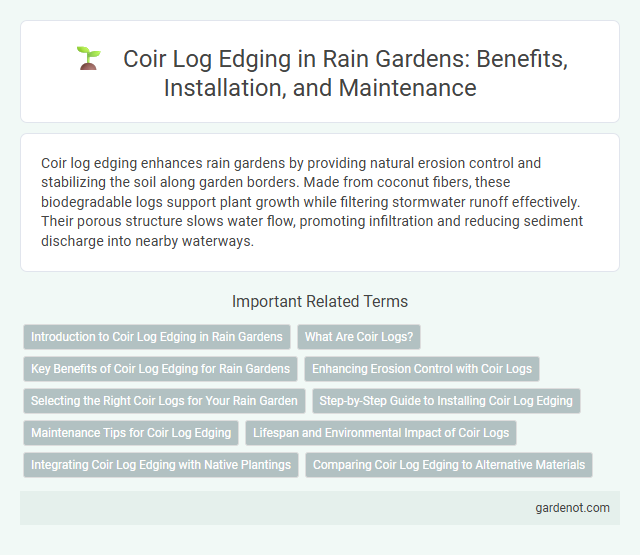Coir log edging enhances rain gardens by providing natural erosion control and stabilizing the soil along garden borders. Made from coconut fibers, these biodegradable logs support plant growth while filtering stormwater runoff effectively. Their porous structure slows water flow, promoting infiltration and reducing sediment discharge into nearby waterways.
Introduction to Coir Log Edging in Rain Gardens
Coir log edging, made from natural coconut fibers, provides effective erosion control and soil stabilization in rain gardens. Its biodegradable nature supports plant growth by retaining moisture and offering a protective barrier around garden beds. This eco-friendly solution enhances both the functionality and aesthetic appeal of rain garden landscapes.
What Are Coir Logs?
Coir logs are cylindrical, biodegradable erosion control products made from coconut fiber, designed to stabilize soil and support vegetation growth in rain gardens. These natural fiber logs help filter stormwater runoff, reduce sedimentation, and promote water infiltration by providing structural reinforcement along garden edges. Coir logs slowly decompose over time, enriching soil quality while enhancing the ecological function of rain garden landscapes.
Key Benefits of Coir Log Edging for Rain Gardens
Coir log edging enhances rain gardens by providing superior erosion control and natural filtration, helping to maintain soil stability and improve water quality. Made from biodegradable coconut fiber, coir logs support healthy root growth and promote native plant establishment while gradually decomposing to enrich the soil. Their durability and eco-friendly properties make coir logs an ideal solution for sustainable rain garden landscaping.
Enhancing Erosion Control with Coir Logs
Coir log edging significantly enhances erosion control in rain gardens by stabilizing soil and reducing surface runoff. Made from natural coconut fibers, these biodegradable logs absorb and filter water while promoting vegetation growth along garden borders. Their durability and permeability make coir logs an eco-friendly solution for managing sediment and preventing soil loss in sloped or high-erosion areas.
Selecting the Right Coir Logs for Your Rain Garden
Selecting the right coir logs for your rain garden involves considering factors such as diameter, length, and fiber density to ensure effective erosion control and plant support. Opt for coir logs made from natural coconut fibers that offer durability and biodegradability, promoting sustainable water filtration and soil stabilization. Properly sized coir logs enhance water absorption and nutrient retention, fostering healthier vegetation growth in rain garden ecosystems.
Step-by-Step Guide to Installing Coir Log Edging
Begin by measuring and outlining the edge of the rain garden where the coir log will be installed to ensure a precise fit. Excavate a shallow trench along the marked edge, about one-third the diameter of the coir log in depth, to securely anchor the log in place. Place the coir log into the trench, securing it with stakes driven through the log at regular intervals, then backfill and compact soil around it to stabilize the edging and promote erosion control.
Maintenance Tips for Coir Log Edging
Regular inspection of coir log edging in rain gardens ensures its integrity and effectiveness in erosion control. Trim any overgrown vegetation carefully to prevent obstruction of water flow while avoiding damage to the natural fibers of the coir logs. Replace or reposition sections showing significant wear or displacement to maintain optimal functionality and landscape aesthetics.
Lifespan and Environmental Impact of Coir Logs
Coir logs, made from coconut husk fibers, typically have a lifespan of one to three years depending on environmental conditions and exposure to moisture. Their biodegradability ensures minimal environmental impact, allowing them to naturally decompose and enhance soil stability in rain gardens without introducing harmful chemicals. This sustainable material supports erosion control while promoting healthy plant growth and maintaining ecosystem balance.
Integrating Coir Log Edging with Native Plantings
Coir log edging enhances rain garden stability by preventing soil erosion while promoting water absorption through its biodegradable structure. Native plantings integrated with coir logs benefit from improved root support and moisture retention, fostering robust growth and increased habitat value. This combination creates a sustainable, eco-friendly barrier that supports natural filtration and enhances biodiversity in rain garden ecosystems.
Comparing Coir Log Edging to Alternative Materials
Coir log edging offers superior biodegradability and natural pest resistance compared to synthetic materials such as plastic or rubber edging used in rain gardens. Its porous structure enhances soil stabilization and water infiltration, outperforming concrete or metal alternatives that may hinder plant growth and water absorption. While coir logs decompose over time, enriching the soil with organic matter, durable alternatives require replacement without offering ecological benefits.
Coir log edging Infographic

 gardenot.com
gardenot.com